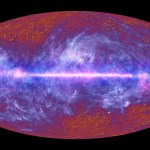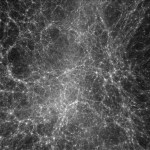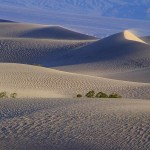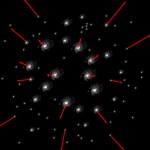cosmic microwave background
"Science cannot tell theology how to construct a doctrine of creation, but you can't construct a doctrine of creation without taking account of the age of the universe and the evolutionary character of cosmic history." -John Polkinghorne
Out there in space, whether we look with our eyes or with a telescope -- a far more powerful version of our eyes -- we find that the Universe is full of stars, galaxies, clusters, and luminous objects everywhere we look.
Image credit: Rogelio Bernal Andreo of http://www.deepskycolors.com/.
But if we look in different wavelengths of light than what our eyes…
"The radiation left over from the Big Bang is the same as that in your microwave oven but very much less powerful. It would heat your pizza only to -271.3°C, not much good for defrosting the pizza, let alone cooking it." -Stephen Hawking
One of the most powerful predictions of the Big Bang -- the fact that our cold, star-and-galaxy-rich, slowly-expanding Universe came from a hot, dense, much more homogeneous state -- was the existence of a bath of leftover radiation that should be detectable, even today.
Image credit: Pearson / Addison Wesley, retrieved from Jill Bechtold.
Back when the…
"Scientific discovery and scientific knowledge have been achieved only by those who have gone in pursuit of it without any practical purpose whatsoever in view." -Max Planck
Tomorrow morning, at 8 AM my time, the press conference that cosmologists have spent the past decade waiting for will finally happen, and the Planck satellite -- the most powerful satellite ever to measure the leftover radiation from the Big Bang -- will finally unveil its results about the origin and composition of the Universe.
Image credit: ESA / LFI and HFI Consortia.
They've figured out how to subtract the…
"If you wish to make an apple pie from scratch, you must first invent the Universe." -Carl Sagan
The Universe is a lot like an extremely intricate cake. We view it today as a snapshot in time, now that it's complete.
Image credit: Blogger user Hilly of http://makesbakesfakes.blogspot.com/.
We can view the whole thing from one point of view, determined by where we happened to be located. But we can also look intricately inside certain sections of it, so long as we have the right tools.
Image credit: Blogger user Hilly of http://makesbakesfakes.blogspot.com/.
But if we truly want to…
This is an enhanced version (with some upgraded images and text) of an article I first wrote over two years ago. It is just as valid today as it was back then, only today, I have a special offer to go with it. Next week, a bunch of cosmologists and myself are getting together and all writing about dark energy. And I want you to have your say.
So at the end of this post, ask your dark energy questions. Ask anything and everything you ever wanted to know about dark energy. I'll choose the best one (or, space & time permitting, more than one) and write a special post on it for you then.…
startswithabang.com reader Andy has a great follow-up to his question on the Age & Size of the Universe, and asks:
why does the CBR “appear” to come from a light sphere that “appears” NOW to be larger than the universe WAS when it first set off in a straight line on its 13.4 billion year trip???
The "CBR" stands for "Cosmic Background Radiation," and it refers to the (presently) microwave background. Here's why Andy's question is actually profound, and was known for about 20 years as either the homogeneity problem or the horizon problem. The problem is that, when we look up at the sky,…
The Universe isn't a static place. Although the laws of nature (physics, chemistry, biology, etc.) don't appear to change over time, everything in the Universe appears to evolve, and changes over time. One of the simplest ways that this happens is through Hubble expansion.
General relativity tells us how the Universe expands, and more specifically, it tells us that the expansion rate (which we call the Hubble constant, H0) is related to the total energy density of the Universe. More matter density: faster expansion. Greater density of photons (i.e., light): faster expansion. More of any and…






